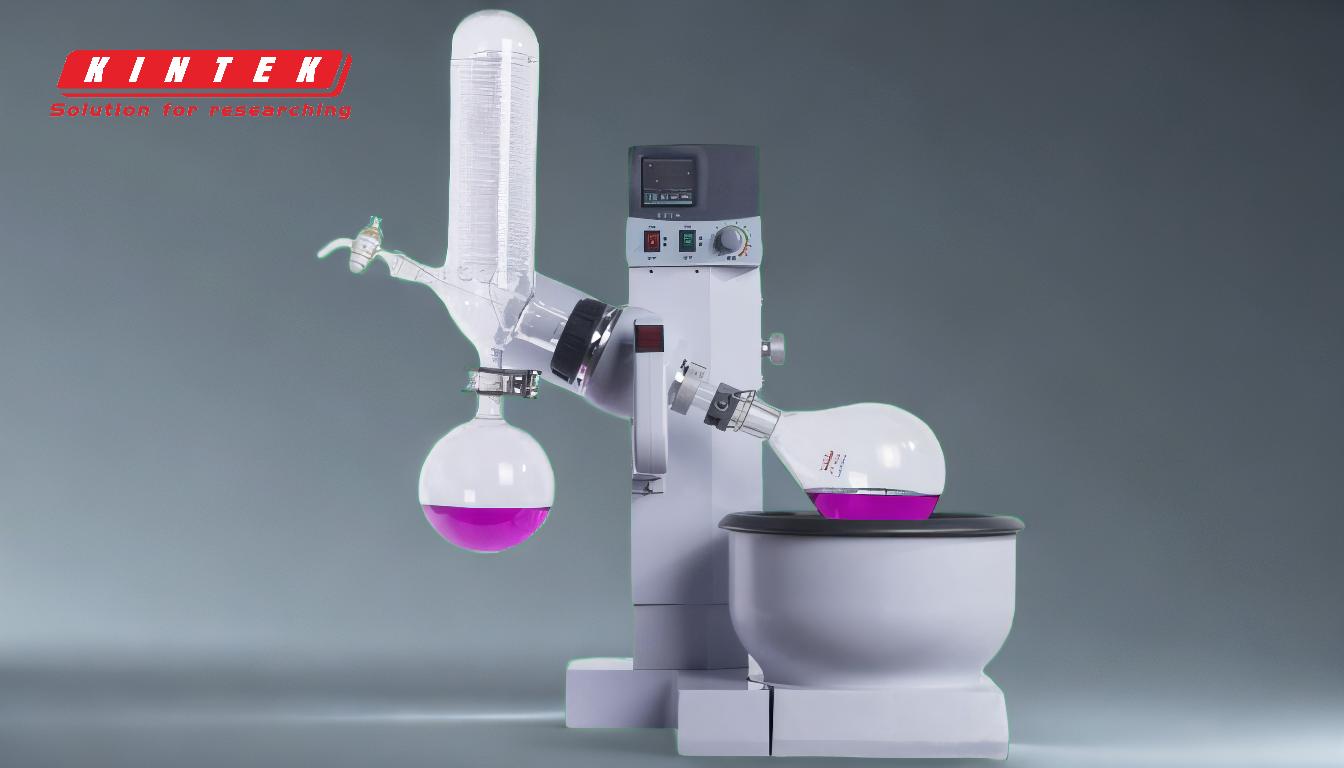A rotary evaporator (rotovap) is more efficient due to its ability to operate under vacuum conditions, which significantly lowers the boiling point of solvents, allowing them to evaporate at lower temperatures. This process minimizes the risk of thermal degradation of sensitive compounds. The rotating flask increases the surface area for evaporation, while the continuous mixing ensures uniform heating and faster distillation. Precise control over parameters such as vacuum degree, heating temperature, and cooling medium temperature further enhances efficiency. Additionally, rotovaps enable near-complete solvent recovery, making them ideal for applications requiring high precision and minimal waste.
Key Points Explained:

-
Vacuum Conditions Lower Boiling Points:
- Operating under vacuum reduces the pressure, which in turn lowers the boiling point of the solvent. This allows solvents to evaporate at much lower temperatures than their standard boiling points, reducing the risk of thermal damage to heat-sensitive compounds.
- For example, a solvent that normally boils at 100°C might boil at 40°C under vacuum, making the process faster and safer.
-
Increased Surface Area and Continuous Mixing:
- The rotating flask in a rotovap increases the surface area of the liquid, promoting faster evaporation.
- Continuous rotation ensures uniform heating and mixing, preventing localized overheating and ensuring consistent distillation.
-
Precise Control Over Distillation Parameters:
- Rotovaps allow for precise control over key parameters such as vacuum degree, heating temperature, and cooling medium temperature.
- This precision ensures optimal conditions for distillation, maximizing efficiency and yield.
-
Efficient Solvent Recovery:
- The design of a rotovap enables nearly 100% recovery of solvents, which is crucial for both cost savings and environmental considerations.
- The condensed solvent is collected in a separate flask, making it easy to reuse or dispose of.
-
Reduced Distillation Time:
- The combination of vacuum conditions, increased surface area, and continuous mixing significantly reduces the time required for distillation.
- For instance, removing ether can be reduced from a couple of hours to approximately 20 minutes using a rotovap.
-
Minimized Risk of Thermal Degradation:
- Lower operating temperatures reduce the risk of degrading heat-sensitive compounds, preserving the integrity of delicate ingredients.
- This is particularly important in industries like pharmaceuticals and food processing, where maintaining the quality of the product is paramount.
-
Key Components and Their Impact:
- Vacuum Pump: The efficiency of the vacuum pump directly affects the vacuum degree, which is crucial for lowering the boiling point.
- Sealing Rings and Vacuum Tubes: Materials like PTFE offer better wear and corrosion resistance, ensuring a tight seal and maintaining the vacuum.
- Cooling Medium: The temperature of the cooling medium (e.g., cooling water) affects the condensation rate of the solvent vapors.
-
Versatility in Applications:
- Rotovaps can separate liquids from solids, remove tannins, and eliminate undesirable elements like color, spice, or bitterness while retaining the full flavor profile.
- This makes them versatile tools in various industries, including chemistry, pharmaceuticals, and food processing.
In summary, the efficiency of a rotovap is attributed to its ability to operate under vacuum conditions, precise control over distillation parameters, increased surface area, and continuous mixing. These features collectively contribute to faster distillation times, minimal thermal degradation, and high solvent recovery rates, making rotovaps indispensable in many scientific and industrial applications.
Summary Table:
| Feature | Benefit |
|---|---|
| Vacuum Conditions | Lowers boiling points, reducing thermal degradation risks |
| Increased Surface Area | Promotes faster evaporation and uniform heating |
| Precise Parameter Control | Optimizes distillation efficiency and yield |
| Efficient Solvent Recovery | Enables near-complete recovery, saving costs and reducing waste |
| Reduced Distillation Time | Speeds up processes, e.g., ether removal from hours to minutes |
| Minimized Thermal Degradation | Preserves integrity of heat-sensitive compounds |
| Versatile Applications | Suitable for pharmaceuticals, food processing, and more |
Maximize your lab's efficiency with a rotary evaporator—contact us today to learn more!











